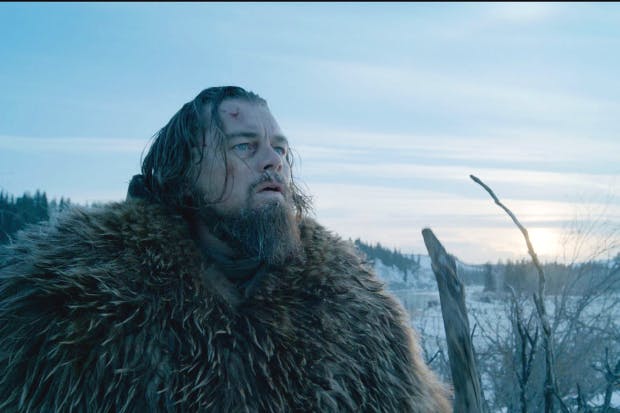The Revenant is a survival-against-the-odds film that so puts Leonardo DiCaprio through it I bet he was thinking, ‘I wish I was back on that boat that went down.’ He is mauled by a bear. Viciously. He is buried alive. He eats still-throbbing, blood-dripping raw liver, and quite forgets his manners. (Wipe your chin, man; there’s never any excuse.) He cauterises his own wounds, falls off cliffs, spins down rapids, slits open a dead horse and sleeps within for warmth. The film recently triumphed at the Golden Globes — best film, best director (Alejandro G. Iñárritu), best actor (DiCaprio) — but all I was thinking was, ‘Oh God, please let this be over soon.’ Faint hope. It’s two-and-a-half hours long, long, long and while there are moments of tremendous, jaw-dropping beauty, the violence is so pitiless and the spiritual aspects so pitiful that even I wished he was back on that boat that went down. I know. Imagine.
This is based, apparently, on the true story of Hugo Glass, a 19th-century fur trapper who became famous in 1823 for surviving that bear attack, being abandoned by the two members of his expedition tasked to stay with him and staggering 200 miles over six weeks to avenge those who had left him for dead. Set in Montana and South Dakota, but filmed in the Canadian Rockies and Argentina, this opens as it means to go on, with grandeur and magnificence — a breathtaking landscape, an icy sun filtering through the groaning pines — combined with unflinching brutality. A hunting party is under attack from a Native American tribe, and the first you know about it is when, thwock!, an arrow bisects one of their throats. And from what I then saw from between my fingers, there were scalpings. (I think.)
Only a few escape, as led by Captain Henry (Domhnall Gleeson), but their progress is substantially stalled when Glass, who is travelling with his teenage son Hawk (Forrest Goodluck), is set upon by that grizzly. This is an astounding scene. The bear is one big mamma. The bear is enormous. The bear ripples and claws. The bear bites and paws. The bear is CGI, presumably, but you can feel its breath on your own face, having forced its way through the gaps between your fingers, and the sequence is filmed in a single, seemingly never-ending take, as if happening in real time. Afterwards, Glass is practically dead. He cannot move. He cannot speak. His wounds gape and pulse. Henry thinks he should kill him, but can’t. Offering money, he commands a fellow hunter, John Fitzgerald (Tom Hardy, employing a weird accent), to stay with him, along with one other (Will Poulter) so the two can give him a decent burial when he dies. Hawk stays too. Hawk is half-Native American, on his mother’s side. Hawk is Glass’s back story, as told in flashbacks. Hawk is fictional, invented by Iñárritu to, presumably, offer up a father-son narrative, thereby adding another emotional layer to the story, but this always feels like exactly what it is: a contrivance, added on for effect. This is not a film you go to see for its emotional complexity is what I’m saying. (I think.)
The action progresses when it transpires that Fitzgerald is not a man of his word, proves murderous, and Glass ends up tossed into an open grave. The rest of the film is then devoted to Glass not dying, as he scrabbles for food and water, falls off those cliffs, spins down those icy rapids, performs self-surgery on his infected, festering wounds — oh, Jesus! — and so on. DiCaprio’s performance is one of grunts and lunges and groans and doing a particular grimace that put me in mind of Jack Nicholson on the poster for The Shining. He doesn’t have much to do beyond this, but he does do it all with conviction.
The film is about its visual aesthetic and splendour — even every little scrap of moss looks truly alive — and the fact that it’s not afraid to heap primal horror on to primal horror, even though I rather wish it were. But Iñárritu (who also gave us the rather gimmicky Birdman) is all swagger and not much else. Story-wise, you have to suspend disbelief and keep it suspended or you’ve had it, basically. Glass, for example, seems to go from disabled to able-bodied with remarkable speed. There are continuity errors, to do with coats and furs and when there’s snow and when there isn’t. As for the flashbacks, which recount the murder of Hawk’s mother by white soldiers, these scenes are sentimental clichés, as well as jam-packed with spiritual banalities. (‘Revenant’, by the way, means ‘a person who returns in spirit after death’ and there is no shame in having to look that up …I hope.)
Whether you enjoy — is that the right word? — this film will essentially depend on how strong your stomach is, and whether stories such as this float your boat. I admired its ambition, but also found it an endurance test. I was longing for it to be over, and so relieved when it was.
Got something to add? Join the discussion and comment below.
Get 10 issues for just $10
Subscribe to The Spectator Australia today for the next 10 magazine issues, plus full online access, for just $10.














Comments
Don't miss out
Join the conversation with other Spectator Australia readers. Subscribe to leave a comment.
SUBSCRIBEAlready a subscriber? Log in